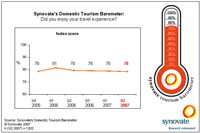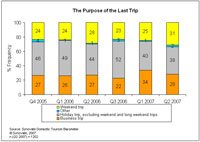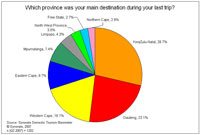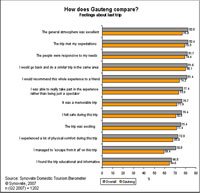
Domestic tourism's autumn/winter wave remains constant
While the number of business trips taken this quarter are on par with the last quarter, the amount of weekend trips have increased from an average of 1.6 to 2.1. This increase is especially pronounced in age group 35 to 49 years and those visiting Kwazulu Natal (KZN).
Trips taken specifically for holiday purposes have decreased slightly from last quarter, which could be related to the fact that interviews were conducted between the 17th of April and the 29th of June, after the major Easter holiday period.
KZN received 29% of domestic traveller share, labelling the region as the leading local destination for this quarter, as opposed to first quarter in which Gauteng held the greater portion. Since Gauteng is the more popular business destination in South Africa, this change is likely due to the decrease in travel for business purposes. A large relative proportion of those travelling to KZN, represent the upper income bracket of domestic tourists and can thus afford local getaways.
When selecting accommodation, hotels remain the most popular option, being the choice of 30% of travellers. Self-catering accommodation options saw an increase in popularity, being the choice of 21%, (from the previous quarter's 17%). 82% of domestic travellers stated that they would visit the same area again and when asked if they would recommend their accommodation to others, 81% responded positively.
Looking more closely into the experiences within the various provinces, Western Cape rated tops (83%) for having the best attractions and places to visit. Mpumalanga performed well in terms of meeting expectations (88%) and resultantly, many respondents (88%) indicated that they would go back and do a similar trip.
The Northern Cape scored the highest in terms of the trip being exciting for visitors there. It also scored highest on the trip being educational and informative trip (77%). KZN scored lowest for educational and informative value with 62% but rated 84% for general atmosphere, which could be related to the nature of visits to the area being for relaxation purposes. Limpopo scored the highest for general atmosphere compared to other provinces (91%).
Gauteng is still the most popular province for business visitors, representing half (51%) of business visitors in the autumn / winter quarter. When surveying the length of their stay, Gauteng domestic tourists have shown to stay for an average of 3.5 days. This is obviously affected by the higher proportion of business travellers. 18% of visitors to Gauteng arranged the details of their trip over the internet.
Looking closer at the satisfaction of given aspects for Gauteng, visitors rated 'Friendliness and helpfulness of staff' as well as “Accommodation” highest (80%) for both. While still reflecting positively, “Attractions and places to visit” received the lowest relative rating at 72% compared to the other attributes. These findings bring to attention that that Gauteng could increase domestic tourist satisfaction by improving communication points which provide visitor information.
A notably high proportion (80%) of travellers stated that they would return to the same area in Gauteng and repeat the experience. It is not surprising then, that 79% of visitors felt that the trip met their expectations and that people were responsive to their needs.
Average expenditure per day for Gauteng visitors has risen sharply from the previous quarter's R875.00 to this quarter's R1247.00.
More about the Survey
The Synovate barometer measures factors affecting the travel experience overall, whether it be for a weekend getaway, holiday or business. The company interviewed 1202 domestic travellers from the more affluent market across the nine provinces.
Fieldwork for Quarter 2 2007 was conducted between 19 April and 29 June 2007.
- Unlocking the value of creativity in advertising: How to bridge the creativity gap15 Apr 13:47
- 4 habits keeping your brand poor26 Mar 16:08
- Understanding consumer mindsets for growth in 202407 Mar 08:52
- South Africa's unemployment nightmare: The burden on its people09 May 10:05
- Global survey shows shrinking trust in internet29 Nov 10:17


















